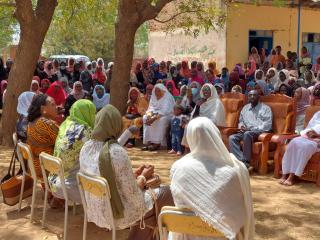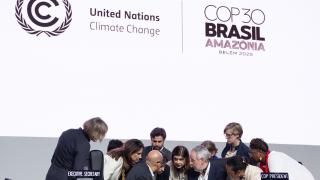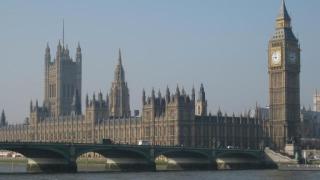
UNA-UK has joined more than 600 civil society organisations to call on all UN Permanent Representatives to ensure women’s full, equal, meaningful and safe participation in all aspects of peace and security.
In advance of the annual Open Debate on Women, Peace and Security on 25 October, we collectively call on all Member States to:
- Demand the inclusion of diverse women at all levels and stages of decision-making, in all contexts, from beginning to end;
- Support women’s participation in all peace and security processes with the target of 50%;
- Call for direct, substantive and formal inclusion of diverse women; and
- Enforce a zero-tolerance approach to any form of intimidation or reprisal against women human rights defenders, peacebuilders and civil society.
Read the open letter below:
Dear Ambassadors,
We write to you ahead of this year’s annual Open Debate on Women, Peace and Security (WPS) to urge you to take action to realize the foundational demand of Resolution 1325 (2000)—ensuring women’s full, equal and meaningful participation in peacemaking.
For nearly 25 years, the Security Council, the UN and Member States have pledged their support for women’s full, equal, meaningful and safe participation in peace and security. Yet women’s rights today are under ceaseless attack in contexts marked by intensifying conflict, rising authoritarianism, militarization and backlash. Women’s participation in peace processes remains unacceptably low, and is decreasing even in UN-supported peace processes. Meanwhile the credibility of the UN and the Security Council to protect and uphold these rights has been fundamentally shaken by growing geopolitical divides and the Russian invasion of Ukraine.
Without principled and decisive action to protect women’s rights and ensure their full, equal and meaningful participation in all aspects of peace and security, we not only risk entrenchment of patriarchal norms, but jeopardize any chance of sustainable peace.
We therefore call on you to demand, and to support, the full, equal, meaningful and safe participation and leadership of the women of Afghanistan, Burundi, Cameroon, the Central African Republic, Colombia, the Democratic Republic of the Congo, Ethiopia, Haiti, Iraq, Lebanon, Libya, Mali, Myanmar, the Occupied Palestinian Territory, Somalia, South Sudan, Sudan, Syria, Ukraine, Western Sahara, Yemen and all other crises on the Security Council’s agenda, in accordance with the standards set by the WPS agenda, in ending conflict and building peace in their countries.
We take this opportunity to remind you of these standards and urge you to uphold them:
“Full”: Full participation requires politically supporting and fully resourcing inclusion of diverse women at all levels and stages of decision-making, in all contexts, from beginning to end. This means women’s participation in all aspects of peace and security, including the design and implementation of all peace processes, the development and monitoring of all agreements, political processes, humanitarian delivery, constitution-building, economic development, transitional justice, post-conflict reconstruction, disarmament, demobilization and reintegration (DDR) processes and security sector reform (SSR) processes. The Security Council must demand and ensure women’s full, equal and meaningful participation, in line with Resolution 1325 (2000) and all other WPS resolutions, in all conflicts and crises on its agenda. Further, it should demand that the UN adopt and implement a principled and consistent approach to women’s rights and women’s participation across all its work, without exception.
“Equal”: Achieving equal representation means taking all possible steps to support diverse women’s participation in all peace and security processes with the target of 50 percent. While women’s participation at all levels of decision-making must be supported, we urge the Security Council, UN and all Member States to publicly and robustly support, and to prioritize, women’s equal, direct and influential participation in formal Track 1 or high-level peace and political processes, where it is most glaringly lacking. This must include meaningful representation of women human rights defenders, peacebuilders and feminist movements. Quotas for women’s participation must be enforced, non-transferrable and publicly advocated for by all actors. Additional specific and targeted measures must be implemented to dismantle structural barriers and ensure that women, in all their diversity, are able to participate on an equal footing as experts and leaders.
“Meaningful”: Meaningful participation means direct, substantive and formal inclusion of diverse women and feminist perspectives to influence the design and the outcome of negotiations, across all issues, as well as their implementation. Failure to uphold women’s right to equal participation, even in conflict-affected situations, undermines the UN Charter, contravenes international human rights and humanitarian law, and jeopardizes sustainable peace. Superficial, last-minute, informal, advisory or other observer status without the opportunity to directly influence decisions and outcomes is not meaningful. We urge Member States to demand that the equal, direct and influential participation of women is a standard requirement across all UN-supported peace processes or convenings. No Member State nor the UN should endorse, facilitate or support peace processes where women are not meaningfully represented. This would send an unequivocal message to conflict parties that international backing is not possible without respect for women’s rights.
“Safe”: Participating safely requires enforcing a zero-tolerance approach to any form of attack, intimidation, retaliation or reprisal against diverse women for their political participation, human rights and humanitarian work, peacebuilding activities or cooperation with UN mechanisms, including the Security Council. Member States and UN leadership must, first and foremost, ensure a safe and enabling environment for civil society in which women human rights defenders, peacebuilders and civil society leaders are protected, supported and their legitimacy is recognized, and eliminate any restrictions or barriers to their work. Further, Member States and the UN must swiftly and publicly condemn any attacks against women human rights defenders, peacebuilders and civil society, hold perpetrators accountable, and, most importantly, take all necessary measures to protect the lives of those at risk. The UN has a critical role to play in this regard—we urge you to call on the UN system to not only thoroughly monitor and report on attacks and violence against women activists, but also provide systematic and scaled-up support to prevent and respond to such violence; so should all peace operations, in accordance with their mandates to protect civilians and promote human rights. Risks and protection must never be used to limit women’s participation or undermine the independent selection or views of civil society, and resources and explicit political support must be mobilized to enable women to participate safely.
In all conflicts and crises, the international community’s uncompromising support for women’s human rights must be matched by unequivocal demands for women’s meaningful participation.
Women’s rights cannot wait.
Read more:
- Download the open letter in English, Arabic, French, Russian and Spanish
- Learn more about the upcoming Open Debate on Women, Peace, Security from Security Council Report
- Read about past WPS Open Debates here
- Watch: UNA-UK co-hosts event on Climate Change and Women, Peace and Security
- Watch: UNA-UK Co-hosts All-Women Panel on Nuclear Disarmament at UN75
Photo: The In Their Hands: Women Taking Ownership of Peace exhibition arrives in Kadugli, Sudan (South Kordofan) with a conversation on women’s participation at a girls’ secondary school. Credit: UNITAMS via UN Peacekeeping.






